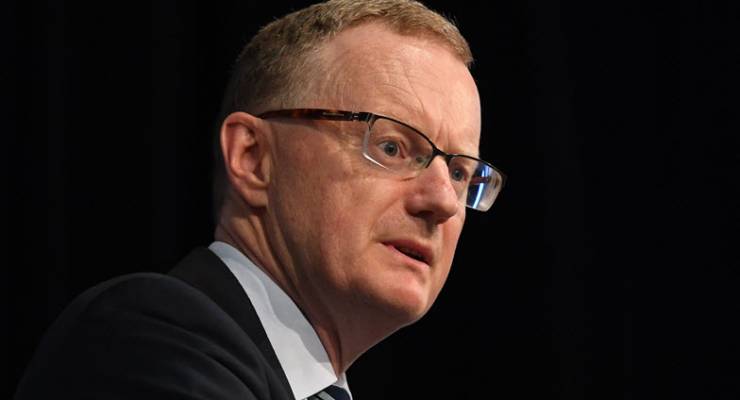
In one sentence in yesterday’s post-Reserve Bank board meeting statement from governor Phil Lowe, summed up its current dilemma – and why interest rates are going to remain lower for longer.
“One continuing source of uncertainty is the outlook for household consumption. Household incomes are growing slowly and debt levels are high.” That compares to a statement after the October meeting: “…slow growth in real wages and high levels of household debt are likely to constrain growth in household spending.”
That subtle but significant change about household consumption suggests the Bank taken heed of the weak retail sales data for the September quarter. Retail sales accounts for around 30% of household consumption — demand for cars and services, for example, remains buoyant. But there’s the weak points of low wage growth (and incomes) and high household debt. The Bank continues to see wages stagnating “for a while yet”, although it still believes “the stronger conditions in the labour market should see some lift in wage growth over time.”
But household consumption seems to have replaced previous worry points for the central bank. For a long time, it was non-mining business investment that the RBA was waiting to show up. Now things are OK on that front: “The outlook for non-mining business investment has improved, with the forward-looking indicators being more positive than they have been for some time.” It used to regularly call for more infrastructure spending, but “increased public infrastructure investment is also supporting the economy.” And the labour market “has continued to strengthen. Employment has been rising in all states and has been accompanied by a rise in labour force participation. The various forward-looking indicators continue to point to solid growth in employment over the period ahead.” Overall, that means a positive outlook: “the central forecast is for GDP growth to pick up and to average around 3 per cent over the next few years. Business conditions are positive and capacity utilisation has increased.”
Despite all that, the statement concludes, “the low level of interest rates is continuing to support the Australian economy.”
The September quarter national accounts on December 6 will give us a good idea of how these positive factors are being offset by household consumption, the savings rate and income growth. The question now for the Reserve Bank is how long does it keep wondering and wishing for a surge in wages, incomes and inflation. If it doesn’t appear soon, the prospect of more of that “support” for the Australian economy might suddenly become a live option.








Check your grammar.
The Reserve Bank are worried about something else now.
Should be IS worried .
Reserve Bank (singular) therefore IS (singular) NOT are .
If it were Reserve Banks (plural) then it would be ARE (plural)
david Hardy, is it Australia is fucked or Australians are fucked, does`nt really matter does, we are fucked
the reserve has finally seen the wolf lurking in the woods, the greed of the conservative 1% and their financial control over their coalition politicians have seen the destruction of unions and slashing of workers conditions and services, as in the U.S, these conservatives are like cancerous tumours that grow and kill their host slowly,and just like tumours they must be removed, only a change of government can save Australia, forget the U.S and also Britain they are terminal, its too late for them.
“One continuing source of uncertainty is the outlook for household consumption.” What, they’ve only just noticed? A little slow on the uptake, aren’t they?
Note to the Reserve Bank: stagnant wages and rising costs= fall in consumption.
less income means more spending?, no wonder we`re in such a mess, the so called economistand financial experts do 5 years at university to arrive at a theory that trickle down economics, wages and penalty rate cuts and loss of conditions s equals increased spending power, then wonder why the economy tanks, that`s recession economics, when you look at the total lack of talent in the lib/nat parties its easy to see why the economy is going down the gurgler, the incompetence of the conservative politicians is only equalled by the stupidity of the people;e that vote for them.
Brian, Adam Smith wrote at the end of his first book in The Wealth of Nations, that those of whom you complain in the finance world had “An interest to deceive and oppress the public”, and having succeeded in the past would do so again.
So perhaps the voters are not so much stupid as successfully “deceived and oppressed” by past masters?